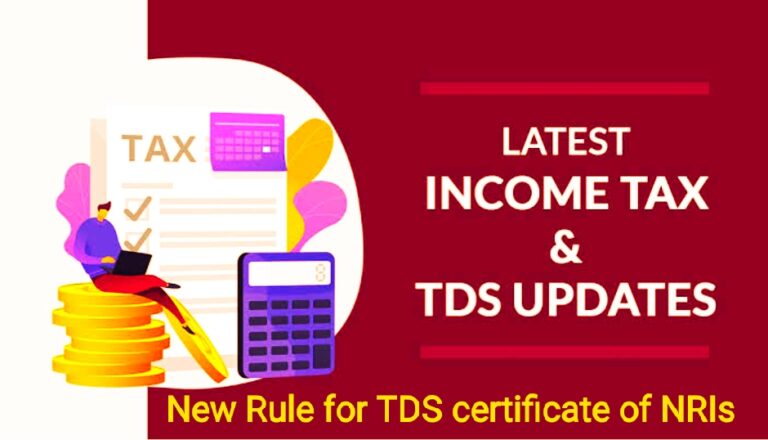Introduction: New Rule of Nil or Low TDS certificate for NRIs
Effective from October 1, a new set of regulations regarding Nil or Low Tax Deducted at Source (TDS) certificates for Non-Resident Indians (NRIs) has been introduced by the Central Board of Direct Taxes (CBDT). These regulations aim to provide NRIs with a means to minimize or eliminate TDS deductions on their Indian income. NRIs earning income in India, such as rent, interest, or dividends, are subject to TDS deductions. However, NRIs can apply for a Nil or Low TDS certificate to mitigate the tax deductions by making an application in Form 13.
Application Process
 To obtain a Nil or Low TDS certificate, NRIs must submit an online application using Form 13. Unlike the previous methods, the recent notification dated 27th September has streamlined the verification process, and now, the only accepted verification method is through a Digital Signature Certificate (DSC). After submission, the assessing officer will evaluate the application, considering the NRI’s reasoning and justification for seeking a reduced or Nil TDS rate.
To obtain a Nil or Low TDS certificate, NRIs must submit an online application using Form 13. Unlike the previous methods, the recent notification dated 27th September has streamlined the verification process, and now, the only accepted verification method is through a Digital Signature Certificate (DSC). After submission, the assessing officer will evaluate the application, considering the NRI’s reasoning and justification for seeking a reduced or Nil TDS rate.
Assessment and Certificate Issuance by AO
 Following successful verification, the TDS Assessing Officer will review the application and cross-reference it with the TDS rates recommended by the income tax department’s software. If both the automated system and the Assessing Officer recommend the existing TDS rate, the application will be declined. However, if a reduced or Nil TDS rate is approved, a certificate will be issued specifying the TDS rate, its effective period, and necessary details like the Tax Deduction and Collection Account Number (TAN) and payer particulars.
Following successful verification, the TDS Assessing Officer will review the application and cross-reference it with the TDS rates recommended by the income tax department’s software. If both the automated system and the Assessing Officer recommend the existing TDS rate, the application will be declined. However, if a reduced or Nil TDS rate is approved, a certificate will be issued specifying the TDS rate, its effective period, and necessary details like the Tax Deduction and Collection Account Number (TAN) and payer particulars.
Validity of Certificate
The certificate issued by the TDS Assessing Officer remains valid for one fiscal year or a specific transaction, as per the terms specified in the certificate. If the NRI submits the TDS certificate with the Indian entity making the payment, this certificate serves as authorization to the payer (the entity making the payment) to either withhold tax at a reduced rate or not withhold any tax at all, in compliance with the approved TDS rate mentioned in the certificate.
Conclusion
The recent changes in regulations provide NRIs with a more straightforward and efficient process to apply for Nil or Low TDS certificates. They need to have a Digital Signature Certificate (DSC) now to validate their application in Form 13. By following these guidelines and obtaining the necessary certificate, NRIs can optimize tax deductions on their Indian income, contributing to a more streamlined financial process.
Follow the Link to access the relevant Notification: CBDT Notification No. 2/2023 Dated.27.09.2023
You Might Also Like: Uttarakhand HC Ruling/22.09.23- “Active PAN can not be a valid ground of initiating proceedings against a non-existent company
